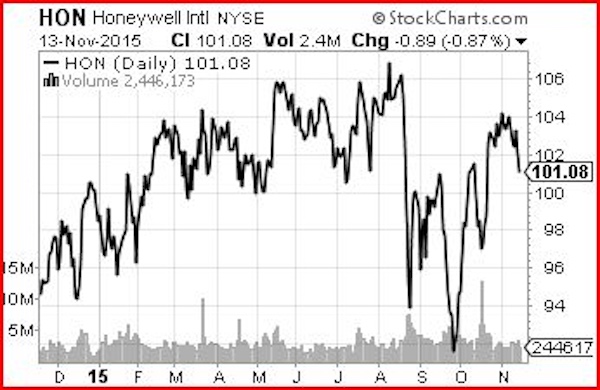Why Honeywell Stock Is Particularly Attractive Now
Ignore the doom and gloom. Keep your eye on stock fundamentals.

Profit and prosper with the best of Kiplinger's advice on investing, taxes, retirement, personal finance and much more. Delivered daily. Enter your email in the box and click Sign Me Up.
You are now subscribed
Your newsletter sign-up was successful
Want to add more newsletters?

Delivered daily
Kiplinger Today
Profit and prosper with the best of Kiplinger's advice on investing, taxes, retirement, personal finance and much more delivered daily. Smart money moves start here.

Sent five days a week
Kiplinger A Step Ahead
Get practical help to make better financial decisions in your everyday life, from spending to savings on top deals.

Delivered daily
Kiplinger Closing Bell
Get today's biggest financial and investing headlines delivered to your inbox every day the U.S. stock market is open.

Sent twice a week
Kiplinger Adviser Intel
Financial pros across the country share best practices and fresh tactics to preserve and grow your wealth.

Delivered weekly
Kiplinger Tax Tips
Trim your federal and state tax bills with practical tax-planning and tax-cutting strategies.

Sent twice a week
Kiplinger Retirement Tips
Your twice-a-week guide to planning and enjoying a financially secure and richly rewarding retirement

Sent bimonthly.
Kiplinger Adviser Angle
Insights for advisers, wealth managers and other financial professionals.

Sent twice a week
Kiplinger Investing Weekly
Your twice-a-week roundup of promising stocks, funds, companies and industries you should consider, ones you should avoid, and why.

Sent weekly for six weeks
Kiplinger Invest for Retirement
Your step-by-step six-part series on how to invest for retirement, from devising a successful strategy to exactly which investments to choose.
It was only two years ago that David Fish, Moneypaper executive editor, observed that "(m)ost of the 'noise' coming out of Wall Street focuses on how high the major indexes have risen and whether the new highs represent a peak." His point? The market pundits were all suggesting that a new bear market might be just around the corner.
Now the “noise” focuses on how the major indexes have fallen this year and the difficulty they have in sustaining each rebound. In other words, a new bear market might be just around the corner, pundits say. The argument is that there are fewer companies with strong earnings growth, which would lead to a collapse in investor confidence just as the Fed begins to raise interest rates.
So it seems that doom lies just around the corner whether stocks are too strong or too weak. Add in weak commodity prices and the plethora of geopolitical unrest, and you have the perfect cocktail of doom and gloom.
From just $107.88 $24.99 for Kiplinger Personal Finance
Become a smarter, better informed investor. Subscribe from just $107.88 $24.99, plus get up to 4 Special Issues

Sign up for Kiplinger’s Free Newsletters
Profit and prosper with the best of expert advice on investing, taxes, retirement, personal finance and more - straight to your e-mail.
Profit and prosper with the best of expert advice - straight to your e-mail.
But let’s step back. If history is any guide, it should be clear that the worries of two years ago ignored the fact that market peaks are generally preceded by a series of new highs, sometimes stretching out over several years.
This year, the volatility and uncertainty ignores the fact that, in the short term, markets are driven as much by emotion as by logic, but strong business operations lead to higher stock prices over the long term.
Our belief now, as it was two years ago, is that investors should focus on the fundamental values of the particular stocks that they own. Strong businesses continue to deliver rising profits (and dividends) year after year, despite the hand-wringing and confusion of traders and pundits, who are in the business of making noise. Don't forget the importance of the “Off” button.
Twice each month, we focus attention on a DRIP stock that appears likely to reward the long-term investor. Our current special is Honeywell International (HON).

Founded in 1920, Honeywell is a global diversified technology and manufacturing company with about $40 billion in annual sales. It operates in four segments: Aerospace (turbine propulsion engines, auxiliary power units, environmental control systems) provides over 30% of sales; Automation and Control Solutions (sensing and security systems for buildings, homes, and industry) over 40%; Transportation (turbochargers, thermal systems, electronic components, and other automotive products) about 10%; and Specialty Materials (resins, chemicals, fibers, films, adhesives) the remainder.
According to Yahoo! Finance, the consensus estimates of 22 analysts call for Honeywell to earn about $6.10 per share this year and $6.56 in 2016, compared with $5.56 in 2014. There are 770.7 million shares outstanding, which is down from 862.3 million in 2003. The dividend has been increased in 10 of the last 11 years, and the most recent increase of 15%, to $2.38 per share annually, provides a 2.3% yield.
What makes Honeywell attractive now is its size and available resources, along with those expectations of higher earnings in the next couple of years. HON has a market capitalization of about $78 billion and an A credit rating, according to Morningstar, which also accords it a wide moat that should deter competitors, a valuable trait during tough economic times, if they should arise. Notably, the newly raised dividend results in a payout ratio of just 39% of earnings, leaving Honeywell with plenty left over for capital expenditures, even in the event of a decline in sales and earnings. Ongoing share repurchases should also enhance per-share results, but can be slowed or suspended if necessary, making the company a "safe haven" during difficult economic conditions.
Honeywell is just one of the high-quality companies that offer investing through a dividend reinvestment plan (DRIP). Honeywell does not charge fees for cash investments or dividend reinvestments through its DRIP. Click here for a list of other no-fee DRIPs.
Ms. Vita Nelson is one of the earliest proponents of dividend reinvestment plans (DRIPs) and a knowledgeable authority on the operations of these plans. She provides financial information centered around DRIP investing at www.drp.com and www.directinvesting.com. She is the Editor and Publisher of Moneypaper's Guide to Direct Investment Plans, Chairman of the Board of Temper of the Times Investor Service, Inc. (a DRIP enrollment service), and co-manager of the MP 63 Fund (DRIPX).
Profit and prosper with the best of Kiplinger's advice on investing, taxes, retirement, personal finance and much more. Delivered daily. Enter your email in the box and click Sign Me Up.

-
 Over 65? Here's What the New $6K 'Senior Deduction' Means for Medicare IRMAA Costs
Over 65? Here's What the New $6K 'Senior Deduction' Means for Medicare IRMAA CostsTax Breaks A new deduction for people over age 65 has some thinking about Medicare premiums and MAGI strategy.
-
 U.S. Congress to End Emergency Tax Bill Over $6,000 Senior Deduction and Tip, Overtime Tax Breaks in D.C.
U.S. Congress to End Emergency Tax Bill Over $6,000 Senior Deduction and Tip, Overtime Tax Breaks in D.C.Tax Law Here's how taxpayers can amend their already-filed income tax returns amid a potentially looming legal battle on Capitol Hill.
-
 5 Investing Rules You Can Steal From Millennials
5 Investing Rules You Can Steal From MillennialsMillennials are reshaping the investing landscape. See how the tech-savvy generation is approaching capital markets – and the strategies you can take from them.
-
 When Estate Plans Don't Include Tax Plans, All Bets Are Off: 2 Financial Advisers Explain Why
When Estate Plans Don't Include Tax Plans, All Bets Are Off: 2 Financial Advisers Explain WhyEstate plans aren't as effective as they can be if tax plans are considered separately. Here's what you stand to gain when the two strategies are aligned.
-
 Counting on Real Estate to Fund Your Retirement? Avoid These 3 Costly Mistakes
Counting on Real Estate to Fund Your Retirement? Avoid These 3 Costly MistakesThe keys to successful real estate planning for retirees: Stop thinking of property income as a reliable paycheck, start planning for tax consequences and structure your assets early to maintain flexibility.
-
 I'm a Financial Planner: These Small Money Habits Stick (and Now Is the Perfect Time to Adopt Them)
I'm a Financial Planner: These Small Money Habits Stick (and Now Is the Perfect Time to Adopt Them)February gets a bad rap for being the month when resolutions fade — in fact, it's the perfect time to reset and focus on small changes that actually pay off.
-
 Social Security Break-Even Math Is Helpful, But Don't Let It Dictate When You'll File
Social Security Break-Even Math Is Helpful, But Don't Let It Dictate When You'll FileYour Social Security break-even age tells you how long you'd need to live for delaying to pay off, but shouldn't be the sole basis for deciding when to claim.
-
 I'm an Opportunity Zone Pro: This Is How to Deliver Roth-Like Tax-Free Growth (Without Contribution Limits)
I'm an Opportunity Zone Pro: This Is How to Deliver Roth-Like Tax-Free Growth (Without Contribution Limits)Investors who combine Roth IRAs, the gold standard of tax-free savings, with qualified opportunity funds could enjoy decades of tax-free growth.
-
 One of the Most Powerful Wealth-Building Moves a Woman Can Make: A Midcareer Pivot
One of the Most Powerful Wealth-Building Moves a Woman Can Make: A Midcareer PivotIf it feels like you can't sustain what you're doing for the next 20 years, it's time for an honest look at what's draining you and what energizes you.
-
 I'm a Wealth Adviser Obsessed With Mahjong: Here Are 8 Ways It Can Teach Us How to Manage Our Money
I'm a Wealth Adviser Obsessed With Mahjong: Here Are 8 Ways It Can Teach Us How to Manage Our MoneyThis increasingly popular Chinese game can teach us not only how to help manage our money but also how important it is to connect with other people.
-
 Looking for a Financial Book That Won't Put Your Young Adult to Sleep? This One Makes 'Cents'
Looking for a Financial Book That Won't Put Your Young Adult to Sleep? This One Makes 'Cents'"Wealth Your Way" by Cosmo DeStefano offers a highly accessible guide for young adults and their parents on building wealth through simple, consistent habits.